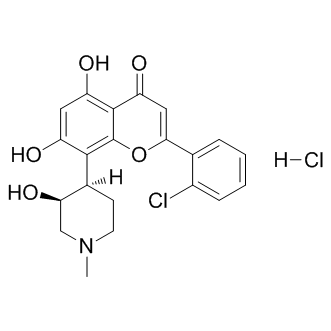| References: |
Flavopiridol hydrochloride competes with ATP to inhibit CDKs including CDK1, CDK2, CDK4 and CDK6 with IC50 of ~ 40 nM. It is 7.5-fold more selective for CDK1/2/4/6 than CDK7. Flavopiridol is initially found to inhibit EGFR and PKA.in vitro: Flavopiridol induces G1 arrest with inhibition of CDK2 and CDK4 in human breast carcinoma cells in a time and concentration dependent manner. Short time treatment of Flavopiridol (~12 hours) induce apoptosis in hematopoietic cell lines including SUDHL4, SUDHL6 (B-cell lines), Jurkat and MOLT4 (T-cell lines ), and HL60 (myeloid). In the clonogenic assay, Flavopiridol functions as a highly potent cytotoxic compound with a mean IC70 with 8 ng/mL in 23 human tumor models. A recent study shows Flavopiridol treatment induces a substantial AKT-Ser473 phosphorylation in human glioblastoma T98G cell line.
in vivo: After treatment with 7.5 mg/kg Flavopiridol bolus intravenous (IV) or intraperitoneal on each of 5 consecutive days, 11 out of 12 advanced stage subcutaneous (s.c.) human HL-60 xenografts undergo complete regressions, and animals remain disease-free several months after one course of Flavopiridol treatment. SUDHL-4 s.c. lymphomas treated with flavopiridol at 7.5 mg/kg bolus IV for 5 days undergo either major (two out of eight mice) or complete (four out of eight mice) regression, with two animals remaining disease-free for more than 60 days. The overall growth delay is 73.2%. |























